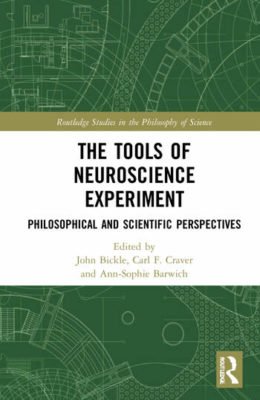The first thing one notices when one enters a neuroscience laboratory are the research tools and their infrastructure. They dominate the space. Neuroscience is a paradigmatic laboratory science. Even in our increasingly “computationalist” times, lab-generated data remains paramount.

What Motivated This Volume (by John Bickle)
A common complaint is that neuroscience is “data rich but theory poor.” The normative judgment implicit in that slogan may be suspect. Most neuroscientists continue to generate gobs of data and the science doesn’t seem to be suffering. What’s more, the research tools that generate these data are themselves in constant flux. Quite literally, one year’s science fiction can be next year’s Nature’s Method of the Year.
Explicit philosophical interest in neuroscience is closing in on forty years. “Neurophilosophy” spawned “the philosophy of neuroscience,” and then “neuroethics,” “neuroaesthetics,” and even “neurophenomenology.” Numerous writers have traced the many twists and turns philosophical interest in neuroscience has taken. But one glaring lacuna looms: the tools of neuroscience experiment! What factors drive new research tool development? What is the relationship between new tool development and neuroscientific theory? Is there an epistemology specific to research tools and their development? How do research tools shape neuroscience’s ontology, the categories it recognizes and investigates? How do the tools of experiment and of computation interact? Do we find a similar dynamics of tool development and use in related scientific fields, such as genetics? These are the range of questions the authors of chapters in this text address. And this is genuinely interdisciplinary work. The volume’s Foreword and 15 chapters had 20 authors or co-authors, 12 philosophers and 8 neuroscientists.
This week will feature overviews of five chapters of the volume by that chapter’s author. My “Tinkering in the Lab” overview is below. Next up will be Carl’s “Toward an epistemology of intervention: optogenetics and maker’s knowledge.” On Wednesday will be Ann-Sophie, overviewing her chapter (co-authored with neuroscientist Lu Xu), “Where molecular science meets perfumery: A behind the scenes look at SCAPE microscopy and its theoretical impact on current olfaction.” Thursday will be Brains Blog editor Dan Burnston overviewing his chapter, “Cognitive ontologies, task ontologies, and explanation in cognitive neuroscience.” We wrap up this week-long series on Friday with Valerie Hardcastle overviewing her timely “A different role for tinkering: Brain fog, COVID-19, and the accidental nature of neurobiological theory development” (her chapter was co-authored by medical research scientist C. Matthew Stewart).
The idea that ultimately produced this volume germinated on a late-night train ride through the Bavarian Alps. Craver and I found ourselves tiring of fighting the “ruthless reduction-versus-new mechanism” dispute, so we started tossing around ideas for a new concern. Less than a decade later, both of us had discovered optogenetics, and we quickly found that this new research tool had piqued the interests of other philosophers of neuroscience. We set up a series of symposia and workshops, and to our great satisfaction we found a group of philosophers, working mostly in isolation from each other, who had started to explore these various questions about experiment tool development and use in neuroscience. (We tell more of the details of this path in our introduction to the volume.) It seemed to us time to put together an edited volume dedicated to these questions. Ann-Sophie Barwich presented at our early symposia and was fresh off the publication of her excellent book, Smellosophy (Harvard University Press, 2020), so we brought her on a third co-editor. Andrew Weckenmann at Routledge quickly gave us the go-ahead with a contract for the volume. It appeared in print on December 31, 2021.
The Editors of The Tools of Neuroscience Experiment: Philosophical and Scientific Perspectives, John Bickle (Mississippi State University and the University of Mississippi Medical Center), Carl F. Craver (Washington University in St. Louis) and Ann-Sophie Barwich (Indiana University, Bloomington) are grateful to the editors of The Brains Blog for the opportunity to publicize our volume. This week will feature daily blogs by Bickle, Craver, Barwich, Dan Burnston and Valerie Hardcastle.

